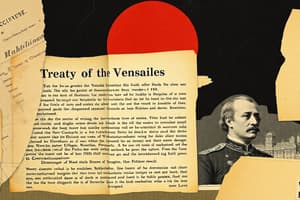Podcast
Questions and Answers
What did the Treaty of Versailles lead to?
What did the Treaty of Versailles lead to?
The Treaty of Versailles led to political instability in Germany.
Flashcards
Wilson's Aim
Wilson's Aim
President Woodrow Wilson's vision for a peaceful world based on countries' right to choose their own government.
Clemenceau's Aim
Clemenceau's Aim
French Prime Minister Georges Clemenceau wanted to weaken Germany to prevent future wars, focusing on security for France.
Lloyd George's Aim
Lloyd George's Aim
British Prime Minister David Lloyd George aimed for a fair peace while safeguarding British interests.
Why League of Nations Faltered
Why League of Nations Faltered
Signup and view all the flashcards
Reasons for Treaty Compromises
Reasons for Treaty Compromises
Signup and view all the flashcards
Why Germany Wasn't Punished More
Why Germany Wasn't Punished More
Signup and view all the flashcards
Punishing Germany for Starting the War
Punishing Germany for Starting the War
Signup and view all the flashcards
Securing Lasting Peace through Territorial Changes
Securing Lasting Peace through Territorial Changes
Signup and view all the flashcards
Goal of Establishing International Organizations
Goal of Establishing International Organizations
Signup and view all the flashcards
Impact of the Treaty on Germany
Impact of the Treaty on Germany
Signup and view all the flashcards
Study Notes
Motives of the Big Three
- Wilson sought a just peace based on self-determination
- Clemenceau aimed to weaken Germany to prevent future threats
- Lloyd George balanced justice with British interests
Why Victors Didn't Get Everything
- Wilson's idealistic League of Nations faced opposition from Clemenceau
- War debts and territorial disputes led to compromises
- Fear of further instability limited punishments
Justification of the Treaty at the Time
- Punishing Germany for starting the war
- Securing lasting peace through territorial adjustments
- Establishing international organizations like the League of Nations
Studying That Suits You
Use AI to generate personalized quizzes and flashcards to suit your learning preferences.




